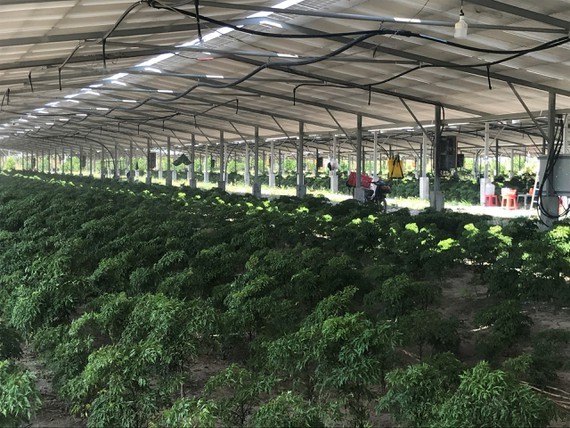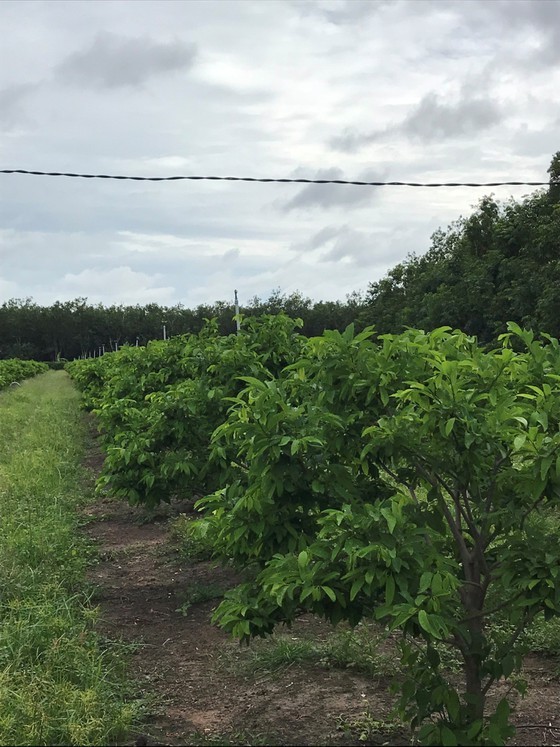09/01/2026, 02:00
Tay Ninh Province develops high-tech agriculture for export
Many high-tech agricultural projects in Tay Ninh Province have been put into operation in recent years, contributing to increasing the value of local agricultural products, creating a boost to attract many large-scale investment projects, heading for sustainable high-tech agriculture.
Changing through restructuring of plants and animals
Previously, in some areas along the Vam Co Dong River, such as in Binh Thanh Commune in Trang Bang Town of Tay Ninh Province, the soil contained high sodium carbonate, so many crops could not grow. Now, it has resurrected, thanks to the application of science and technology in agricultural production.
Nguyen Van Sau's family in Binh Thanh Commune has bravely converted dozens of hectares of rice land with low economic efficiency to growing pineapples for higher economic efficiency, with a profit of about VND70 million per ha per year, nearly three times higher than rice cultivation.
Besides, high-tech agricultural production activities in greenhouses and net houses have also brought efficiency, such as growing melons in Ben Cau District and growing vegetables in Duong Minh Chau District.
As for the model of growing melons, the family of Doan Van Nhan in Ben Cau Town converted their rice-growing area and invested nearly VND300 million to grow 2,400 melon vines in a net house, following the high-tech agricultural model. In the first harvest, his family earned a profit of VND40 million, contributing to changing the land, which used to grow only rice on alkaline soils.
In the process of restructuring the agricultural sector, with a focus on applying high technology to production for the above results, Tay Ninh Province has implemented the zoning of specialized fruit growing areas in Tan Chau, Tan Bien, Chau Thanh, and Ben Cau districts, suitable for each type of soil and characteristics of each plant. The province has identified key plants, including durian, whose revenue reached VND500 million-VND650 million per ha in 2020, with a profit 10 to 15 times higher than rice cultivation; custard apple, which is five times more profitable than rice cultivation; pomelo and banana, whose profits are 4.5 times to 7 times higher than rice.
Previously, in some areas along the Vam Co Dong River, such as in Binh Thanh Commune in Trang Bang Town of Tay Ninh Province, the soil contained high sodium carbonate, so many crops could not grow. Now, it has resurrected, thanks to the application of science and technology in agricultural production.
Nguyen Van Sau's family in Binh Thanh Commune has bravely converted dozens of hectares of rice land with low economic efficiency to growing pineapples for higher economic efficiency, with a profit of about VND70 million per ha per year, nearly three times higher than rice cultivation.
Besides, high-tech agricultural production activities in greenhouses and net houses have also brought efficiency, such as growing melons in Ben Cau District and growing vegetables in Duong Minh Chau District.
As for the model of growing melons, the family of Doan Van Nhan in Ben Cau Town converted their rice-growing area and invested nearly VND300 million to grow 2,400 melon vines in a net house, following the high-tech agricultural model. In the first harvest, his family earned a profit of VND40 million, contributing to changing the land, which used to grow only rice on alkaline soils.
In the process of restructuring the agricultural sector, with a focus on applying high technology to production for the above results, Tay Ninh Province has implemented the zoning of specialized fruit growing areas in Tan Chau, Tan Bien, Chau Thanh, and Ben Cau districts, suitable for each type of soil and characteristics of each plant. The province has identified key plants, including durian, whose revenue reached VND500 million-VND650 million per ha in 2020, with a profit 10 to 15 times higher than rice cultivation; custard apple, which is five times more profitable than rice cultivation; pomelo and banana, whose profits are 4.5 times to 7 times higher than rice.
Besides, many other localities in the province, including Duong Minh Chau, Go Dau districts, and Tay Ninh City, focus on urban agricultural production combined with tourism, such as hydroponic vegetable cultivation, ornamental fish farming, and orchid growing.
In the field of animal husbandry, in Tay Ninh Province, many animal husbandry models have appeared, such as livestock farming combined with earthworm farming for the production of micro-fertilizers; the application of modern technologies in animal husbandry, ensuring biological safety and environmental protection; modern and automatic egg sterilization and selection system of QL Farms Company in Thanh Binh Commune in Tan Bien District.
Attracting many large enterprises
According to Mr. Nguyen Dinh Xuan, Director of the Department of Agriculture and Rural Development of Tay Ninh Province, in recent years, the agricultural sector has focused on developing key crops in the direction of promoting intensive farming, large-scale fields, and synchronous mechanization, increasing productivity and quality, reducing product costs, ensuring raw materials for the processing industry, linking production with consumption, building several models, and promoting the transfer of the application of advanced science and technology on key crops in the direction of forming specialized production areas associated with the market and processing industry.
In the field of animal husbandry, in Tay Ninh Province, many animal husbandry models have appeared, such as livestock farming combined with earthworm farming for the production of micro-fertilizers; the application of modern technologies in animal husbandry, ensuring biological safety and environmental protection; modern and automatic egg sterilization and selection system of QL Farms Company in Thanh Binh Commune in Tan Bien District.
Attracting many large enterprises
According to Mr. Nguyen Dinh Xuan, Director of the Department of Agriculture and Rural Development of Tay Ninh Province, in recent years, the agricultural sector has focused on developing key crops in the direction of promoting intensive farming, large-scale fields, and synchronous mechanization, increasing productivity and quality, reducing product costs, ensuring raw materials for the processing industry, linking production with consumption, building several models, and promoting the transfer of the application of advanced science and technology on key crops in the direction of forming specialized production areas associated with the market and processing industry.
The model of growing custard apple trees under the VietGAP standards of Natani Company. (Photo: SGGP)
By June this year, the whole province has 102 growing-area codes and 21 codes for packing establishments of fresh fruit, which have been granted by the Department of Plant Protection under the Ministry of Agriculture and Rural Development to export to markets, including the EU with one growing-area code, the US with three growing-area codes, Australia and New Zealand with one growing-area code and one packing establishment code, and China with 97 growing-area codes and 20 packing establishment codes.
From 2019 to 2022, the agricultural industry will let fruit-growing organizations and individuals input data into the electronic traceability software Kipus, creating favorable conditions for fruits to be exported to other markets, including fastidious markets.
Currently, the agricultural industry has completed a project on policies to encourage investment in the agricultural sector with many investment support packages and prepared land funds for enterprises with capacity and high technology to invest. The results of investment attraction in the agricultural sector in the 2019-2020 period were 67 projects, 4.7 times higher than in 2018. Of which, 21 projects were in the field of cultivation, mainly organic fertilizer production, fruit tree cultivation, such as guava, Indian jujube, and dragon fruit, medicinal plant growing, and mushroom growing. Of which, there were two projects of growing fruit trees combined with ecotourism and two projects of growing bananas and fruit trees. The remaining projects mainly concentrated on raising chickens, cows, goats, and swiftlets.
Many large-scale projects, such as the project of converting from growing sugarcane to growing South American bananas for export combined with animal husbandry with an investment of VND363 billion in Chau Thanh District; the project of raising one million hens for one million eggs per day of QL Farms Company with a capital of up to VND794 billion in Thanh Binh Commune in Tan Bien District; the project of raising 400,000 hens of TS Farm Company, with an investment of VND261 billion in Phuoc Minh Commune in Duong Minh Chau District.
Up to now, Tay Ninh Province has attracted 24 projects, with a total capital of over VND1.65 trillion. Of the projects, Tanifood fruit and vegetable processing factory, with a total investment of VND1.82 trillion, and Vinamilk Tay Ninh dairy farm that meets GlobalGAP standards, with a herd of 8,000 cows, are the most outstanding ones.
The development of high-tech agriculture is a breakthrough direction of Tay Ninh Province that has been proposed by the 11th Tay Ninh Provincial Party Congress for the term of 2020-2025. In which, the focus is on the planning of the high-tech agricultural areas to attract strategic investors, guiding farmers to develop together.
From 2019 to 2022, the agricultural industry will let fruit-growing organizations and individuals input data into the electronic traceability software Kipus, creating favorable conditions for fruits to be exported to other markets, including fastidious markets.
Currently, the agricultural industry has completed a project on policies to encourage investment in the agricultural sector with many investment support packages and prepared land funds for enterprises with capacity and high technology to invest. The results of investment attraction in the agricultural sector in the 2019-2020 period were 67 projects, 4.7 times higher than in 2018. Of which, 21 projects were in the field of cultivation, mainly organic fertilizer production, fruit tree cultivation, such as guava, Indian jujube, and dragon fruit, medicinal plant growing, and mushroom growing. Of which, there were two projects of growing fruit trees combined with ecotourism and two projects of growing bananas and fruit trees. The remaining projects mainly concentrated on raising chickens, cows, goats, and swiftlets.
Many large-scale projects, such as the project of converting from growing sugarcane to growing South American bananas for export combined with animal husbandry with an investment of VND363 billion in Chau Thanh District; the project of raising one million hens for one million eggs per day of QL Farms Company with a capital of up to VND794 billion in Thanh Binh Commune in Tan Bien District; the project of raising 400,000 hens of TS Farm Company, with an investment of VND261 billion in Phuoc Minh Commune in Duong Minh Chau District.
Up to now, Tay Ninh Province has attracted 24 projects, with a total capital of over VND1.65 trillion. Of the projects, Tanifood fruit and vegetable processing factory, with a total investment of VND1.82 trillion, and Vinamilk Tay Ninh dairy farm that meets GlobalGAP standards, with a herd of 8,000 cows, are the most outstanding ones.
The development of high-tech agriculture is a breakthrough direction of Tay Ninh Province that has been proposed by the 11th Tay Ninh Provincial Party Congress for the term of 2020-2025. In which, the focus is on the planning of the high-tech agricultural areas to attract strategic investors, guiding farmers to develop together.
RECOMMENDED TOPICS











